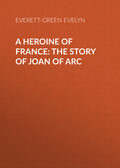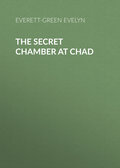
Everett-Green Evelyn
The Lost Treasure of Trevlyn: A Story of the Days of the Gunpowder Plot
Chapter 26: Jacob's Devotion
"If thou wouldst save thy friend from a terrible fate, come hither to me without delay."
Jacob stood gazing at this scrap of parchment as one in a dream, his slow wits only taking in by degrees the meaning of the mysterious words.
"Thy friend," he repeated slowly, "thy friend! What friend? I have many. Terrible fate! Saints preserve us, what means that? Can it be Cuthbert who is in peril-that rash Cuthbert, for ever diving into matters he had far, far better let alone, and burning his fingers for naught? Can it be of him it speaks? Belike it may. There have been ugly whispers abroad of late. Mine uncle told me only this day that some constables came to his door asking some trivial questions anent his household, and speaking of Cuthbert by name. It would be like his folly at such a moment to run his head into a noose.
"But he shall not be hurt if I can help it. Who is this wise woman who sends the message? Methinks I have heard Rachel speak of her ere now. Well, I can but go visit her and hear what she would have to say. I know the house in Budge Row; I took Rachel to the door once. For myself, I love not such hocus pocus; but if it be a matter of Cuthbert's safety, I will e'en go and listen to her tale. If she wants to filch money from me for foul purposes, she will find she has come to the wrong man. I will pay for nothing till I have got my money's worth."
It was already dark. Jacob had been partaking of one of Martin Holt's hospitable suppers. Cuthbert had been absent, and Mistress Susan had remarked with some acrimony that the young man was growing a deal too fine in his ways for them. He came and went just at pleasure; and she did not think it well to encourage him in his idleness and irregularities. Martin opined that he had been amusing himself by watching the preparations for the grand doings on the morrow. The King was in London, and would open his Parliament the next day. Little was being talked of but that event all over London that night.
And now, on reaching his home, Jacob found this brief missive awaiting him, and started forth again, wondering not a little whither it would lead him. The streets were almost empty. Budge Row was dark and silent as the grave. Yet as he looked up at the tall narrow house, a window from above was softly opened, and a low voice over his head spoke in soft, urgent accents:
"Hist! make no sound. Wait but a moment. I will open to you."
Jacob waited, and almost immediately the door was cautiously opened, and a head looked round, a pair of dark eyes peering up into his face.
"It is well, Jacob Dyson, thou hast come," said the same voice, in the lowest of low whispers. "But I may not speak with thee here. Thou must come with me elsewhere. Tyrrel's men are in this house, carousing in their cups. But they have ears like the wild things of the forest. I may not bring thee within the door. They think that I be gone to my chamber to sleep. They will seek me no more tonight. And before the morrow dawns our task must be accomplished."
"And what is that task?" asked Jacob breathlessly.
"To free Cuthbert Trevlyn from the bonds that hold him; to save him from the power of those who will, when the morning dawns; deliver him up to the emissaries of the law as one who has taken part in the vilest plot that has ever been conceived by heart of man!"
Jacob started, and faced his companion, who was hurrying him along the dark streets at a rapid pace.
"Plot, woman! what dost thou mean?" he cried, alarmed and distrustful, and yet impelled to let her lead him whither she would, dominated by the power of her strong will. "I must know more of this matter ere I go further. I have heard fell whispers ere now, but I know not what their truth be. I am a peaceable, law-abiding citizen. I mix myself not up in such doubtful matters. Speak plainly, and tell me what thou knowest, and what evil or harm threatens Cuthbert Trevlyn, or I vow I will go no further with thee. I will not be made a tool of; I will not walk in the dark."
He stopped short, and she did the same, still holding his arm in a close clutch. They had reached one of the many city churches; the big building loomed up before them dark and tall. The wise woman drew her companion within the shelter of the deep porch. Here they could speak at will; none could overhear them now.
"I will tell thee all in as few words as may be. Thou knowest me as the wise woman of Budge Row; but once I was the queen of the woodland, the queen of the gipsy tribes there, and I still hold some power over the children of the forest. They still bring me news of all that passes there. Cuthbert Trevlyn has found the lost treasure, and in finding it has killed one of the tribe. Hatred and greed have been alike stirred up. Many are bound together against him. If he cannot be snatched this night from the clutches into which he has let himself fall-oh, why would he not heed my warnings? – nothing can avail to save him.
"Listen, Jacob Dyson. Tyrrel, the notable highwayman, upon whose head a price has long been set, has this night taken Cuthbert Trevlyn prisoner, hoping to win from him the secret of the hidden treasure which now lies in his keeping. Cuthbert has refused to tell him aught; and now he purposes to strive to turn this to good account for himself by delivering him up to the officers of the law upon the morrow, as being concerned in a fearful plot that tomorrow will make the ears of all England tingle.
"Dost thou stare at that? hast thou indeed heard aught of it? There have been whispers abroad; but the matter hath been kept wondrous close. Cuthbert Trevlyn has by his hardihood, his curiosity, and his fidelity to friends, who are no true friends to him, placed himself in jeopardy. He ought to be in hiding now; for if upon the morrow the name of Trevlyn gets noised abroad, there will be scant mercy shown him by the judges of this land."
"Cuthbert a prisoner! Cuthbert delivered up to judgment!" cried Jacob, aghast. "What meanest thou, woman? What hath he done?"
"He bath done no evil; but he hath shown himself imprudent and reckless. He has been seen in company he ought to have fled; he has visited places against which he was warned. Tyrrel knows this. Tyrrel knows how to turn to his advantage everything of like nature. Tyrrel will give him up at the moment when hue and cry is being made for all concerned in this matter. He will give him up, and men will bear witness where and how he was seized, where and how he has been seen before this. Men's minds will be all aflame with rage and fear. The wildest tale will obtain credence, and there be nothing so wild in what they may truly say of Cuthbert Trevlyn. The Tower gates will close upon him, and they will only open to him when he is led forth to die. Have I not lived long enough to know that? If he he not saved tonight, nothing can avail to save him afterwards."
Jacob felt a strange thrill run through him at these words,
"And why dost thou tell me this, of all men, woman? What can I do to save him?"
He saw that she had raised her face as if to strive to scan the expression on his; but the darkness foiled her, neither could he see aught but the gleam of her dark eyes.
"I come to thee because time presses, and I know not where else to turn. Thou hast been his friend before; wilt thou play a friend's part now, even if it be fraught with peril?"
Jacob paused a few seconds before replying, and then said simply, "What can I do?"
"I will tell thee," answered Esther, speaking rapidly. "Cuthbert Trevlyn lies bound in a house not far away. Tomorrow, so soon as the news of the plot is noised abroad, and all is in commotion to discover the conspirators, he will be delivered up to those who are searching for these; and if thou knewest as much as I, thou wouldst know that nothing then can save him. But there be yet twelve hours before this can happen, and if he can be rescued within those twelve hours, and lodged with me in my house at Budge Row, I will undertake to hide him so well till all hue and cry be past and over that none shall find him; and before the glad Yuletide season has come to rejoice men's hearts, he shall be free to go where he will and show his face with the best of them."
This and much more did the eager gipsy pour into Jacob's astonished ears as he stood in the shadow of the deep porch. Every detail of the capture was made known to him, the whole plot laid bare, as she had heard it from the lips of the men who had borne Cuthbert ashore, and had then been so cunningly plied with heating liquor by the astute old woman that they had babbled freely of those very things that Tyrrel would fain have had held secret as the grave, at least for twenty-four hours longer.
Jacob listened, and as he listened his mind was strangely stirred. Here was his rival in deadly peril of his life; and if Cuthbert were once to be removed from his path, had not Cherry almost promised, in time, to be his wife? And had he not done all he knew to warn Cuthbert from just those friendships and associations which had ended by placing him in this terrible peril? Could anything more be looked for from him? What did this strange woman think that he could accomplish?
Cuthbert was truly his friend and comrade. He had proved it once by risking his life to aid and abet him. But now what could he do? And surely in these perilous times, when all men knew they must walk warily, it behoved him to take heed to his steps.
"And what can I do?" he asked, as the woman paused.
"Art thou willing to strive to save him at some peril to thyself?"
Jacob paused for a full minute. A host of tumultuous feelings rushed and surged through his brain. A thousand conflicting impulses swayed him as he revolved the situation with all the rapidity of quickened thought.
It was but a minute, yet it seemed like an hour to him before he placed his hand upon that of the eager woman and answered steadily:
"I am willing."
She clutched his hand and held it fast.
"My heart did not deceive me. I knew that thou wert a true man. Jacob Dyson, listen to my words, and take good heed to them, and I will strive so to work that no harm shall befall thee, albeit I may not deny that thou mayest stand in some jeopardy. Take and put on this long cloak that I carry beneath my arm; wrap it well about thee, and turn up its collar that it hide well thy face. Pull thy hat down over thy eyes-so. And now take this ring and put it upon thy finger. I have told thee where Cuthbert Trevlyn is lodged this night. Go to the house and ask speech of Master Dibbler. When thou seest him, show him that ring, and tell him that Esther, the wise woman, has sent thee with it, and that she desires him to let thee have a brief interview alone with his prisoner, who has something to say to thee for me of the utmost value to all. Show not thy face, show only the ring, and unless I be greatly deceived, he will take thee to the prisoner forthwith, and lock thee up together alone. The rest thou canst almost divine. Thou must lose no time, but cut the cords that bind him, wrap him in this cloak-ye are much of a height-and so muffled he may well pass out in the darkness unheeded. Thou must stay behind in the prison bound as he was bound. In the morning thou wilt be given over to the officers of the law; for I misdoubt me much that Dibbler will ever find out the trick that has been played upon him. He never saw Cuthbert Trevlyn before, and I trow he has scarce observed what manner of man he is. He will deliver thee up for one Cuthbert Trevlyn, taken in the act of fleeing to the house where the conspirators are known to lodge.
"But I trow that thy father's solid weight and Esther's acuteness can soon serve to set thee at liberty. It will be an easy task to show to all the world that thou art Jacob Dyson, a peaceable citizen, and that thou hast been wrongly apprehended in the place of another. Thou wilt be able to prove that at the hour men say they found thee in that dark garden thou wast in thy father's or thine uncle's house. Thy captors will be confused, enraged, bewildered, and will have to explain how they come to be striving to pass off Jacob Dyson as an evil doer. I trow well we can turn the tables upon them.
"Art thou willing to run some small peril for the sake of serving one who has called thee friend?"
And Jacob, with scarce a moment's pause, replied once again, "I am willing."
Next day, the morning of the fifth of November, 1605, dawned clear and still and bright. London was early astir; for was not the King to open his Parliament that day? and were not hundreds of loyal subjects going to line the streets to see the procession pass? If the King were not popular, the Prince of Wales, Prince Henry, was; and a sight was a sight to the simple folk of those days, even as it is still.
But before long a curious change passed over the face of the London streets. A breath-a whisper-a fleeting rumour. Men's faces grew suddenly pale and grave. Women uttered sharp exclamations of astonishment and fear. People pressed together into knots, asking quick questions and awaiting the answers in breathless expectancy; and presently the whispers became changed into open cries and shouts. A smothered roar as of execration and menace ran through the streets, being caught up and passed from mouth to mouth till it was surging along like a great billow on the wide Atlantic sea.
"A Popish plot!"
"Down with the Papists!"
"Blow up the whole of the Parliament Houses-King, Lords, and Commons!"
"Heard ye ever the like before?"
"Taken in the very act-with the barrels of gunpowder laid ready, and the slow match in his hand!"
"A curse upon all such vile traitors!"
"A curse upon the Papists!"
"England will never know peace till she has destroyed them root and branch!"
"Down with the whole brood of them-the vile scum of a vile race!"
These and many like cries were passing through the crowd in great, gusty shouts. Martin Holt, standing at the door of his shop, was just taking in the sense of what was passing, and anxiously ruminating upon the fact that Cuthbert had not been home all the night, when Abraham Dyson came hurrying up, his face pale with apprehension.
"Good Master Holt, hast thou heard the news?"
"That the Papists have tried to blow up the Parliament Houses? Can such a thing be true?"
"As true as daylight; there is no manner of doubt as to that. But I have another trouble than that, which has been happily averted. They tell me my boy has been arrested as one of the conspirators. I am about to hasten down and inquire into it.
"Martin, where is Cuthbert?"
"I have not seen him since yesterday noon. What of him? Has he-the foolish, hot-headed boy-gone and run himself into like trouble?"
"I know not-I know naught of him; only methought they might be together, being such friends and comrades."
"They were not together yesterday. Jacob supped here with us, and knew naught of Cuthbert then."
"Supped with you last night! that is good hearing, for men say he was seen at Lambeth then, where the conspirators have some house or hiding place. Come thou with me, good Martin, I prithee. I must take solid men to witness for my lad, and bring him safely home again. I warrant me he has had no dealings in yon foul plot! He hates the very name of Popery and scheming."
Martin Holt lost not a moment in following his friend, who was joined by several sober and wealthy merchants and citizens, all deeply indignant at the insult received by their friend in this false accusation of Jacob.
Abraham Dyson had been warned by a letter of the peril in which his son stood-a mysteriously-worded letter, but one that was evidently written by a friend. It advised that Dyson and his friends should proceed at once to Westminster and Whitehall, where the excitement would be at its height, and there they would find Jacob in custody, and would doubtless be able speedily to obtain his release, since he had been arrested under a misapprehension.
Whoever had written these words had plainly known the truth; for when the city men had almost fought their way through a howling and wildly excited mob, they found Jacob, bound and guarded, being just led before some of the King's counsellors under the name of Cuthbert Trevlyn.
"That man is not Cuthbert Trevlyn," shouted old Abraham, forgetting all but the fact that he saw his son in dire and deadly peril. "This is a quiet and peaceable Protestant citizen. Here am I with friends ready to testify the same. This is nothing but another vile Papist plot, conceived to strive to do to death good, peaceable citizens of contrary faith, while they escape the doom their traitorous villainy deserves!"
This astute form of vindication roused another clamour from the crowd. There was not the smallest difficulty in proving Jacob's identity, in establishing his innocence and obtaining his release. Those in authority saw at once that it was one of those innumerable cases of mistaken identity, and did not even care to waste time over a close inquiry into circumstances; whilst the bystanders were raving in indignant sympathy, perfectly convinced that it was all the work of the conspirators themselves, to try to throw their own guilt upon the innocent, and by no means sure that their own turn might not come next.
When Jacob was free, he turned to the King's counsellors and said:
"If it please you gentlemen to fall upon and make away with a notable band of outlaws and robbers, who have long made the terror of the southern roads, they be all beneath your very hand today-gathered together in an old barge not far above Lambeth, where they be waiting the issue of this day's work, knowing far more about it than peaceable and well-minded men should do. Tyrrel is the name of the leader, and he and the best part of his band will hold high revel there this night. They will fall an easy prey in your hands if it please you to send and take them."
The crowd shouted in delight. There was no love lost between the citizens of London and those freebooters who made all travel so perilous, and the name of Tyrrel was widely known and widely feared. The counsellors conferred together awhile and asked many questions of Jacob, and then they released him with courteous words of regret, intimating that if good came of this hunt after the outlaws he should not lose his reward.
His father lost no time in getting him safely home, and questioning him closely as to how he came to find himself in such a predicament; but all he answered was that he and Cuthbert had been about a good deal together, and that they had been mistaken for one another. As for Cuthbert, he was safe enough, but would remain in hiding for some few weeks. He was innocent of all complicity in the plot; but his carelessness had caused him to be suspected of some knowledge of it, and suspicion at a moment of popular frenzy was almost as fatal as actual guilt. When the real culprits had been discovered and had paid the penalty of their crime, smaller persons would be safe once more. Silence and obscurity were the safest shields for the present, and to no living soul did he reveal the secret of Cuthbert's hiding place.
London was soon ringing with the news of the death or capture of the plotters of the Gunpowder Treason, as it quickly began to be called; and those interested in the matter heard with satisfaction that Tyrrel and his band had been surprised, and all upon the barge had been either apprehended or slain. Tyrrel had died sword in hand, as became a man of his calling, and the few who had escaped to their old haunts had warned their comrades there, who had fled the south country forthwith, and were scattered no man knew whither.
Only to one person did Jacob presently tell the whole story of that strange night when he set out to rescue Cuthbert from dire peril, and that person was his cousin Keziah. The tale aroused her deepest interest, and from that moment Jacob became to her a hero as well as an idol. The honest youth had never been idolized before-never in his wildest moments had he hoped to rise to the level of a hero; and there was something so wonderful in finding himself so regarded that it began to have a softening and even an elevating effect upon him, and to draw forth an answering admiration and love.
The end of it was that before the Yuletide season had come, he went blushing to Martin Holt to ask for the hand of his second daughter Keziah in marriage instead of that of Cherry, whose heart had from the first been given elsewhere; and it was arranged that the marriage should take place almost at once, for Jacob pleaded he had waited long enough for his wife, and Keziah's only wish was to please her future lord and master.







